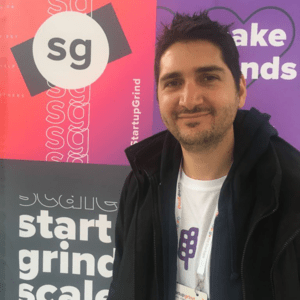I’m a computer engineer transformed into a ⚙️ passionate No Coder ⚙️. Reach out if you want to get introduced or learn more about the No Code world!
It’s not so complicated: Validation at early stage startups
About this episode
The crazy thing about validating a startup idea is that:
- it is not difficult and
- it reduces the risk of failure by like 50% to 80%
And it’s insane that more people don’t invest time more time in this
In this episode, Neil Cocker tells us why it’s not so complicated to validate a startup idea.
What they talked about:
- Common mistakes when dealing with startup or customer validation
- The Problem Solution Product framework
- Why entrepreneurship is a process
- Solving needs that the customers will pay for
- When your customer research is enough to proceed to the next steps
And all those in less than 22 min!
Transcript
Neil Cocker: Hi, my name is Neil Cocker. I’m a startup founder and mentor. I, my background is actually the music industry. So the first sort of 10 years of my career, I was a DJ and producer, I was lucky enough to sort of DJ all over the world around the record label that had a UK Top 10 hits, you know, toured everywhere from Australia to America, and Europe and had a great time doing it. But I moved into tech about 10-12 years ago, at the time, I didn’t really know what I was doing. And it’s just been a very hard learning process. So a lot of my expertise comes from basically my failures. And also being in a kind of a small startup community where the kind of expertise you need isn’t always easy to get hold of. So you know, I kind of appreciate the value that of stuff like Growth Mentor ads, you know, because you can find the expertise you need in a way that maybe I couldn’t find 10 years ago when I when I started out.
Spyros Tsoukalas: Welcome, Neil, it’s great to have you here. Like, we’ve been a long way, like our meetings have been like, I feel it’s forever since..
Neil Cocker: Yeah.
Spyros Tsoukalas: we met each other before he joined Growth Mentor. So let’s go straight to validation at early stage startups tell us something we didn’t know about early stage validation.
Neil Cocker: It’s something you don’t know. Well, that’s difficult, you know, these days, because I mean, I think so many startups read a lot of good blog posts, right, there’s a lot of really, really good content out there. I think the difficulty is a practical bit, the actually having the disciplines put it into into place. But my kind of, I suppose my, my secret little nugget for you that I don’t think a lot of people talk about is like, what we would call like a proxy signal. And I’m just trying to think of a good example of this. So people might not say I’m looking to buy a new car. But what they might do is ask a question on Twitter about car insurance, or the range of an electric vehicle, or stuff like that. So I find Twitter incredibly powerful as a search engine for intent. And, you know, so by using the smart keywords, you can search Twitter and find people who are not like out there, you know, because, you know, if you want to sell someone a car, you won’t have to wait for them to come to you. Or you have to find ways in which they are showing their intense by a car. And sometimes that can be about research. And a lot of people use Facebook, Twitter to ask questions before they go about, like buying a car, right? So. So I find when I’m doing my customer research and validation, I do a lot of that stuff. I start, I reach out to people who are tweeting, like, oh, what’s the range of A Model X of Tesla, right. And they’re not actively using the words by Tesla, but what they are doing is they’re doing their preliminary research, so you can catch them before they actually go to the buying intention phase. So that’s kind of something I use quite a lot. And it’s not. It’s not it’s not something that a lot of people do is like, what are the understanding what the proxy behaviours are? For for their buying intention.
Spyros Tsoukalas: Amazing. Like, I have never thought that I could use Twitter in that way. And actually, I’m not on Twitter. So another reason to be out there.
Neil Cocker: You don’t have to be on Twitter, you can search it, I think I’m pretty sure you can search without an account, we’ll just sign up and just don’t use it just but you, you can, you know, go search Twitter.com. I always use search Twitter.com. And you can get some quite complex searches going there, like around certain keywords. And, and in itself, it’s not, it will not tell you, it will not unnecessarily help you validate. But those are the people that you can reach out to and say, “tell me a little bit more about that. Why are you doing this?” You know, that’s where your custom research comes in. Because a lot of people are like, hey, I want to build this product. But I don’t know where to find the people who are like buy the product. It’s like, well, maybe that’s a sign that you know, there’s not a product that needs to be sold. But equally, people are signaling all day every day with their social media intentions. And some of that stuff is open in Twitter, and you can access it if you’re smart.
Spyros Tsoukalas: Awesome, awesome. So given your experience with startups, like mentoring, etc., what are the most common mistakes you have seen taking place when startups begin? Because validation is like one of the first stages and most startups fail. So something is related there?
Neil Cocker: Yeah. So I think what most people, the number one problem I see is that most startups just don’t do it at all. Or they just don’t do it effectively. So I did a lot of research a year or so ago, where I asked a lot of startup like put in order these, these stages of what you should do when building your first startup is like raise funding, find a mentor, validate your problem, you know, an all of them putting the validation really, really high. But when you ask them later in the survey, put in order, what you did and what you’ve done so far, they weren’t doing it. And it’s like some kind of cognitive bias going on there. They understand a lot of them understand that it’s something they should do. But they’re still not doing it. The other thing is that most you know, a lot of them, it’s for them. It’s just an unknown unknown, but they just don’t know they have to do it. So they’ll read like, you know, either read some inspirational blogs about going out and hustling and waking up at 4am, drinking a protein shake then two hours of power yoga then hustle hard, hustle hard. And they think that’s enough, right? But entrepreneurship is primarily a process of like removing risk, right? So as an example, you’ve got like, you’ve got problem, then you’ve got solution, then you’ve got products, right? So let’s say the problem is, you understand the problem to be that people are hungry first thing in the morning. So you go solution is breakfast, right? And then your product could be toast, it could be fruits, it could be bagel, it could be porridge, you know. So, the solution you know, so understanding the difference between those things, but what’s happening is most people are not understanding the problem enough. So let’s say, you come into a small town, and everyone’s like, I’m hungry first thing in the morning, like, sell me a product and you go. Okay, I’m gonna build a toast or a sandwich cafe. Right? And that’s all I’m gonna throw all my money into that because I am gonna solve your hunger problem, right? But if you’ve done your customer research successfully and properly, what that looks like more often than not, is you’re speaking to your customers. And you’re saying, Okay, tell me about your day. And I wake up and I’m hungry. Okay, that’s interesting. What do you normally do about that? Well, it’s kind of a problem. And I don’t know, but like, okay, so let’s fast forward a bit. What do you do about lunch? Oh, I normally have a salad. Okay, so why don’t you have a salad and not sandwich? Oh, because I, I can’t eat gluten and gluten intolerant. Oh, interesting. And then what do you do after lunch? Well, normally, after lunch, I go for a run, because I’m training for a marathon. Ah, okay. That’s interesting, right? So all of a sudden, you’ve got a lot more context around what the problem might be. So if we go back to that problem solution product, then the problem is, they’re hungry. But the much more nuance understanding is, they’re hungry, but they can’t eat wheat, and they need something high calorie because they’re training for a marathon. But it’s the solution isn’t just breakfast, the solution is a high calorie breakfast with low with slow, slow, release carbs, that doesn’t contain wheat. So then that limits the products you can provide. And it makes you go okay, well, the obvious product here is much more likely to be like, porridge with bananas and honey, than it is to be toast because we know we can’t have toast because they are gluten intolerant. And we know toast is not going to be enough calories. So like because they’ve not understood the problem properly in the first place. They just got are they hungry? Yeah, great. I’ll go and solve that problem. It’s just no your own standard tiny bit of the problem. So the problem is, in short, they don’t speak to their customers is the number one common mistake. They they start building a product, everyone around them goes, you’re amazing. This is clever, well done. And I’ve just done a tweet thread about this. And it’s kind of blown up a little bit because it’s like, we support we sometimes basically don’t do startups a favour by telling them, sorry, this is shit. And there’s no customers for it, because you’re not solving a real problem that people are willing to pay for. And people need to hear that sooner and earlier. Sometimes they will. If they listen to the customer property, they’ll hear that from the customer. But the problem is sometimes the ecosystem go, Hey, you’re amazing, great, you know, get up at 4am power yoga, bah, bah, bah, if you smash it, smash, smash it, eventually you’ll succeed. And it just doesn’t work like that.
Spyros Tsoukalas: Why do you think this takes place? I have been there done that I have seen others doing it. Why do you think this happens?
Neil Cocker: Um, I think I think there’s a couple of things. I think in the first place. We want to believe like a lot of the literature and a lot of the kind of stuff that gets retweeted the stuff that gets shared on Instagram, the blog posts that make the kind of inspirational ones. And sometimes the hard thing to read is like, you know, what, it’s a process. And you have to go through the process, and you will never ever, it’s like the same reason that propaganda spreads more quickly, the nuance discussion. You know, we see this discussions around, you know, we’ll say things like Brexit is a perfect example. It’s easy to just say, oh, foreigners are terrible, let’s close all our borders and get rid of the foreigners. When actually the the more nuance discussion is like, yeah, immigration is difficult and it’s we don’t have to do that and you know, there’s economic issues and but but but, but sometimes the easiest thing to understand is the thing that gets the most clicks, and the thing that gets retweeted the thing that gets shared. So I think as we don’t have the discipline to do it right in the first place. And the second thing is, we as founders, let our identity get tied up with the product. So we then build something we put all our time and our heart and our money and our three years of our life into building a product, as well as that. And this is me, this is who I am. And then when the market just says, I don’t care, or someone or an advisor, or a mentor, or someone who deeply understands the problem comes to us and says, You’re not solving a problem, we take that personally. But if we make it our life’s mission to solve the problem, instead of tying our identity to the products, it’s a lot easier, because then we just go, Oh, my life’s mission is solve the problem. I don’t give a shit what the product is. And if I have to pivot 15 times, until I’ve solved this very, very big real problem, I’ll do it. I don’t care, because the product is irrelevant. Like, that’s why investors don’t sign NDAs. That’s why I don’t care about this. Like I wrote a blog a while ago. It’s like, Yes, look, you and I could sit here for the next 15 minutes and we could come up with 100 good ideas, right. But none of those will be good businesses, because we don’t understand the problem behind the idea, right? Like, I know, let’s look back at the crisps here on my desk, right? The good idea is crisp delivery service to my desk, because I had to go out and buy these crisps, it will be great, right? It’s not a big enough problem for me, like, you know, like, that’s an idea. But the difference between a good idea and a good business is like worlds apart.
Spyros Tsoukalas: We fall in love with our own ideas.
Neil Cocker: We absolutely do and our own problems. Yeah, absolutely. Our own products are not the books. And actually what we should be falling in love with is a customer problem.
Spyros Tsoukalas: Great. That was my next question like what should founders companies, people who aspire to build businesses, what they what should they be doing? Like, should they be problem led, like value led, customer led like this?
Neil Cocker: I mean a lot of that comes down to a lot of these things always come back to the same thing, right? So you can talk about it, like the lean methodology or whatever. But it’s about solving a need that the customer wants solved, right? It’s just like knowing that they will pay for like, there’s only really you’re looking for an underserved need in the market that is better than existing solutions. And the way you do that, the things that they should be doing, and all this stuff, whether it’s problem led, value led, however you it’s all about speaking to your customers, and understanding your customers. And like Rob Fitzpatrick says in the his book, the Mom Test, which I think is kind of the Bible for for this kind of stuff. And I always recommend startup founders to read it. People say, oh, when Steve Jobs was like this visionary, and he didn’t, he didn’t speak to his customers. He just went and built the most beautiful, amazing thing. And it’s like, what Rob says in his book, you can bet every penny that you have. But Steve Jobs fundamentally understood the pains of his customers, just because he went and did it without asking them or not, he didn’t visibly ask them. He didn’t like run survey groups. But he totally understood what his customers wanted, before he went and built the iPhone or whatever. Right? So, but for most of us may mortals most of us aren’t Steve Jobs, right? And thankfully, because, you know, it sounds like a lot of the way a lot of ways us kind of problematic guy in some respects. But he he totally understood his customers. And so we have to go and do that because we most of us don’t have the brain of Steve Jobs. He obviously was a visionary, right? And most of us aren’t that visionary. And again, coming back to your earlier question about why do these mistakes happen? It’s because Steve Jobs is a much more compelling story than it’s really hard to go and build a startup and follow a process and fall in love with the problem is really really really hard. What’s an easier thing to click share on Instagram or Twitter is is like Steve Jobs was a visionary, he ploughed his own furrow and he did his own thing. And he ignored all the naysayers and blah, blah, blah. And it’s like, yeah, but that’s, that’s one of 10,000 most huge startups, most successful startups are built by quiet, diligent people who just go about their business and understand the customer problem.
Spyros Tsoukalas: Great summary. So let’s go back to something you said earlier. So in the beginning, it’s like, validation is an known unknown. And then it becomes like because somebody listened to you or a mentor or read a blog post and known unknown. And let’s say that they decide to actually try to do something about it. So let’s say customer research or interviews or whatever, how would you define like how much is enough? Like okay, I will start doing customer research just like yesterday. Like, I will do interviews, I will do talk to people, I will talk to mentors, I will find customers, I will research competitors, I will do everything. What, can we procedure like this a little, like, when is enough? How much would they be doing? Like? Any thoughts on that?
Neil Cocker: Yeah. 100%. Now I, I mean, I wrote all this down like I’ve, I’ve kind of written my own kind of framework around this. So if you Google gone, Google, how to validate your startup Neil Cocker, that it’s like, it’ll be you know, it’s one of the top search results for how to validate your startup. And first thing I always recommend is like, if you’re going to speak to customers, read The Mom Test by Rob Fitzpatrick first, because if you don’t, you’re just going to ask shit questions, and you’re gonna get shit data, right? So understand how to ask those questions. And I won’t go into that now, because it’s like, but it’s, it’s about getting a much more rounded understanding of the customer. You know, the thing I said earlier, like you hit, everyone goes, Hey, I’m hungry. And you go, well, I will serve you toast. It’s like, yeah, but you don’t understand the nuance around the problem. And the nuance around the problem is like, I’m training for a marathon, and I can’t eat wheat. So it totally changes your products, right. And then if you’re in love with your product, you’re never gonna get right. So you have to ask questions to draw that information out. And that’s a skill that takes time. But if you read the right books, and blogs, you’ll get there. The other thing is, like, I alluded earlier to like Twitter, I use Twitter a lot to reach if I if I don’t instantly know, like 20 people in my network, who might be customers, I use Twitter and even LinkedIn to like, find these people. I drop them a line. There are various ways that I think there’s some templates on the blog posts I wrote. And then you have these conversations. And you’d be surprised at how many people are willing to have these conversations. I kind of I give some hints and tips about how to because you know, everyone’s time is precious, right? But there are there are ways to get people to talk to you. Now, I tend to find after about the 10th conversation I’ve had with my target customer, maybe even less, some repeating threads start coming out that perhaps I hadn’t even thought of. Sometimes it validates what you already believe to be the problem. But sometimes they’ll be going oh, yeah, it’s like, I don’t know, whatever I how I suddenly realised that I run out of money before the end of the month, and therefore the last few days. And if you speak to enough people, you find that these kinds of whatever the problem is, whether it’s finding enough crisps, or finding enough drinks, or you know, and again, if you don’t ask the right questions, you get shit data, the perfect example of this as I was speaking at a conference couple of years ago, and I had a drink in my hand. And I was like, how many people here have ever spilled a drink? Right? And 300 hands went up. 100%. So in my head, ah, solution stopped me spilling drinks. And it’s like, well, no, because none of us are going to put a lid on our cup of tea, right? It’s just not how it works. Maybe when we’re out walking, yes. But not for mugs. Because one of them are mug, I’m at my desk. And if you speak to 100 people, none of them are going to say when you ask them about drinking tea, none of them are gonna say I’m always spilling my tea, but maybe one in 100 would say that. If you ask the wrong question, how many people have spilled a drink? 100% of people say yes. But if you speak to 100 people and say, tell me about your how you drink, and then the problems you encounter when you have a drink. Hardly any of them will say I spill a cup of tea. I say tea because I’m British, right? So, thoughts, if everyone only drink red wine, and they live in a house that only has white carpets, then the problem might be big enough that’s worth solving. But for most of us if I spill a cup of tea, I swear it myself wipe it up and get on with my day. It’s not a big problem. So it’s understanding how to ask the right questions and I tend to find after 10 to 15 conversations thread starts come out and then you can start to dive down those those roots a little bit more with your future. Things People might say are you know, I’ve got a white carpets and you maybe you got Okay, well, maybe I how do I go to market strategy is finding people who have white carpets and only drink red wine. And that’s when you start looking at Twitter for more but you know, and it’s you start to make more nuance, have more nuance discussions, but when you first start you’re just like, hey tell me about how you drink tea? And you just speak to as many people as possible and what are the problems there, you know? So yeah, it’s, it’s in answer to your question. That’s kind of a long, rambling answer. Like, you’ve just got to start speaking to people, and eventually threads starts. It’s a discipline and it takes time and there’s no shortcut. And you can do surveys, but surveys are really only a weigh in then you don’t get the real insight from surveys, you have to have the conversation on the phone in person in real life.
Spyros Tsoukalas: I’m just browsing through your blog post. And for anyone listening out there, like the post literally says, there’s a process with eight to nine hours of preparation, and then one working day of customer conversations to get your idea validated by Neil, as he just described. So go ahead, read it and start validating your startup ideas.
Neil Cocker: And the crazy thing about this is it’s not difficult, but it will reduce your risk of failure by like 50, 60,70, 80%. And it’s absolutely insane that more people don’t do this because building a startup is about the riskiest thing you can do in terms of likelihood of failure. So you’re insane. If you don’t do simple things that help you reduce the failure rate, but why would you not do that? It’s a really weird kind of cognitive bias we have in startup world.
Spyros Tsoukalas: Exactly, exactly. Neil, thank you so much for this amazing conversation. I hope that people will enjoy it as much as I did.
Neil Cocker: Hey, really my pleasure to chat to you is really good fun.
In this episode


Experienced startup founder/CEO, startup community builder, accelerator director, coach and mentor. Worked in 5 countries with 100s of startups.
Join the community
Enjoy the peace of mind that advice is always only one Zoom call away.


